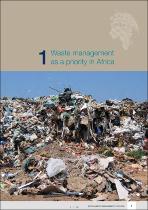JavaScript is disabled for your browser. Some features of this site may not work without it.
- ResearchSpace
- →
- Research Publications/Outputs
- →
- Book Chapters
- →
- View Item
| dc.contributor.author |
Katima, JHY

|
|
| dc.contributor.author |
Godfrey, Linda K

|
|
| dc.date.accessioned | 2019-01-25T08:05:59Z | |
| dc.date.available | 2019-01-25T08:05:59Z | |
| dc.date.issued | 2018-06 | |
| dc.identifier.citation | Katima, J.H.Y. and Godfrey, L.K. 2018. Introduction: Waste management as a priority in Africa. In: Africa Waste Management Outlook, pp. 1-10. Nairobi: United Nations Environment Programme | en_US |
| dc.identifier.isbn | 978-92-807-3704-2 | |
| dc.identifier.uri | http://wedocs.unep.org/bitstream/handle/20.500.11822/25514/Africa_WMO.pdf?sequence=1&isAllowed=y | |
| dc.identifier.uri | http://wedocs.unep.org/handle/20.500.11822/25514 | |
| dc.identifier.uri | http://hdl.handle.net/10204/10640 | |
| dc.description | Chapter published in Africa Waste Management Outlook, pp. 1-10 | en_US |
| dc.description.abstract | Africa is the world’s second largest continent after Asia, with a total surface area of 30,365,000 km2, including several islands. It stretches approximately from 37 degrees latitude north to 35 degrees latitude south and has 54 sovereign countries (48 mainland and 6 island States). It is bounded by the Mediterranean Sea to the north, the Atlantic Ocean to the west, the Red Sea to the northeast and the Indian Ocean to the east. Africa’s population was estimated at 1.26 billion in 2017 (UNDESA 2017). Although Africa as a whole has a major development aspiration in the broader context of a global and continental economic development agenda, individual African countries are increasingly facing development challenges. Waste management is one of them. As the following chapters will show, while different countries face different issues, there are common waste management challenges that could be solved using the teachings and practices of other African countries. The Africa Waste Management Outlook (WMO) is therefore intended to highlight both the challenges and the possible solutions for sustainable waste management in Africa, and to provide opportunities for countries to learn from what others in Africa are doing. | en_US |
| dc.language.iso | en | en_US |
| dc.publisher | United Nations Environment Programme | en_US |
| dc.relation.ispartofseries | Worklist;21892 | |
| dc.subject | African waste management | en_US |
| dc.subject | Waste recycling | en_US |
| dc.title | Introduction: Waste management as a priority in Africa | en_US |
| dc.type | Book Chapter | en_US |
| dc.identifier.apacitation | Katima, J., & Godfrey, L. K. (2018). Introduction: Waste management as a priority in Africa., <i>Worklist;21892</i> United Nations Environment Programme. http://hdl.handle.net/10204/10640 | en_ZA |
| dc.identifier.chicagocitation | Katima, JHY, and Linda K Godfrey. "Introduction: Waste management as a priority in Africa" In <i>WORKLIST;21892</i>, n.p.: United Nations Environment Programme. 2018. http://hdl.handle.net/10204/10640. | en_ZA |
| dc.identifier.vancouvercitation | Katima J, Godfrey LK. Introduction: Waste management as a priority in Africa.. Worklist;21892. [place unknown]: United Nations Environment Programme; 2018. [cited yyyy month dd]. http://hdl.handle.net/10204/10640. | en_ZA |
| dc.identifier.ris | TY - Book Chapter AU - Katima, JHY AU - Godfrey, Linda K AB - Africa is the world’s second largest continent after Asia, with a total surface area of 30,365,000 km2, including several islands. It stretches approximately from 37 degrees latitude north to 35 degrees latitude south and has 54 sovereign countries (48 mainland and 6 island States). It is bounded by the Mediterranean Sea to the north, the Atlantic Ocean to the west, the Red Sea to the northeast and the Indian Ocean to the east. Africa’s population was estimated at 1.26 billion in 2017 (UNDESA 2017). Although Africa as a whole has a major development aspiration in the broader context of a global and continental economic development agenda, individual African countries are increasingly facing development challenges. Waste management is one of them. As the following chapters will show, while different countries face different issues, there are common waste management challenges that could be solved using the teachings and practices of other African countries. The Africa Waste Management Outlook (WMO) is therefore intended to highlight both the challenges and the possible solutions for sustainable waste management in Africa, and to provide opportunities for countries to learn from what others in Africa are doing. DA - 2018-06 DB - ResearchSpace DP - CSIR KW - African waste management KW - Waste recycling LK - https://researchspace.csir.co.za PY - 2018 SM - 978-92-807-3704-2 T1 - Introduction: Waste management as a priority in Africa TI - Introduction: Waste management as a priority in Africa UR - http://hdl.handle.net/10204/10640 ER - | en_ZA |






